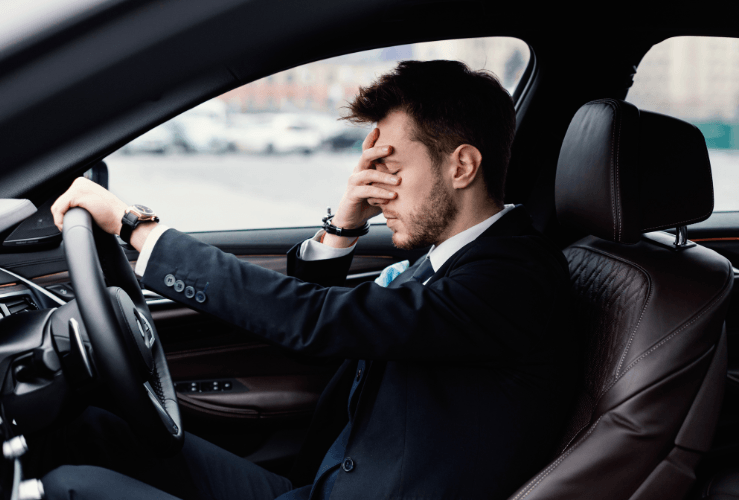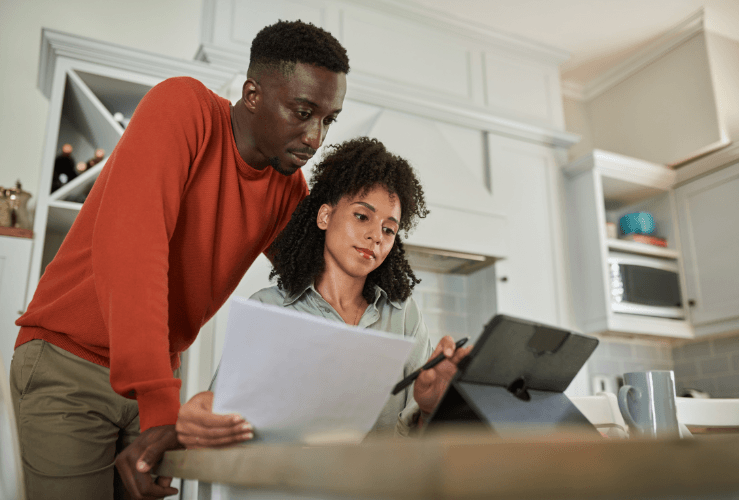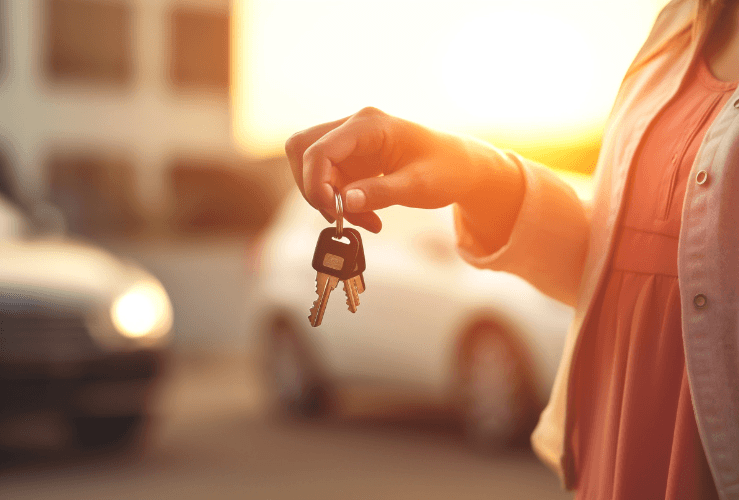Driving stress can be triggered by all kinds of past experiences, perceived threats, ongoing life challenges and environmental factors. But often - if not always - the locus of these anxieties is in our mind.
In this article we'll look at some of the causes of motoring anxiety and what we can do to manage it - including mindfulness techniques, and improving aspects of our life and lifestyle that can affect our ability to be mindful in the first place.

Why do people get driver anxiety?
There are countless reasons why people experience driving stress or anxiety. Some of these can be easily identified - such as having been involved in a collision or near miss - but the root of others are much more tricky to pinpoint.
Common triggers and phobias
Here are some of the most common triggers for anxiety on the road - rooted in a particular phobia.
Fear of accidents
This might be triggered by a personal experience, the responsibility of driving with passengers, or even hearing about someone else's bad experience on the road.
It might even be prompted by news reports or TV shows involving car accidents.
A bad driving experience
It makes sense that if you have had an accident - or narrowly avoided one - then you may experience driver anxiety.
Claustrophobia
If you have - or have developed - a fear of enclosed spaces (claustrophobia), then spending long periods in the cabin of a car could be problematic.
Driving in tunnels, on lanes enclosed by trees or hedges, or being stuck in traffic jams, could worsen any claustrophobic tendencies.
Performance anxiety
It's not uncommon for people to feel the burden of responsibility behind the wheel, leading to driving stress. After all, you're in charge of a machine that could potentially cause serious damage, injury or even death to you, your passengers and other road users.
Less seriously, perhaps, there could be a fear of being judged as a poor driver (by your passengers or other road users, for instance).

Anxieties around specific driving situations
Some drivers may have - or develop - a general driver anxiety. Others may get nervous in specific on-the-road situations, such as:
- Driving at high speeds
- Driving on the motorway
- Driving over bridges
- Being stuck in traffic jams
- Being tailgated or fear of holding up traffic
- Fear of roundabouts
- Responsibility of having passengers in the car
- Driving in the dark
- Driving near large vehicles

Symptoms of driving anxiety
Fear or anxiety behind the wheel will manifest itself in that unmistakable and unpleasant internal tension that we all know. But specific symptoms include:
- Dizziness
- Confusion
- Increased heart rate
- Palpitations
- Sweaty palms
- Trembling
- Frequent adrenaline rushes
- Dry mouth
- Shallow breathing
How to relax when driving: Mindfulness techniques & tips
On the subject of mindfulness, the NHS website states: "Paying more attention to the present moment – to your own thoughts and feelings, and to the world around you – can improve your mental wellbeing."
We can often spend too much time "in our heads", rather than noticing how our own body feels, or what's going on around us.
Being mindful of these things can take us out of our heads - and therefore reduces anxiety. It can also make us better drivers since we’re more aware of what’s happening on the road.
Mindful.org states, "According to neuroscience research, mindfulness practices dampen activity in our amygdala and increase the connections between the amygdala and prefrontal cortex."
Of course, we have a better chance of being more mindful if other aspects of our lives are in good order.

Dealing with stress in other areas of your life
Sadly, if you're experiencing stress at work or in your relationships, it may well affect your motoring - making you less mindful of other road users and obstacles, and less liable to enjoy calm driving.
Additionally, if you're feeling threats in the form of financial worries, combative colleagues, or argumentative family members, you may project these negative emotions onto other road users or driving in general - and see motoring as laden with threats or risks.
Try to tackle or resolve these stress points and you may feel calmer behind the wheel. This is easier said than done, of course, but it could be a good place to begin.
Avoid caffeinated drinks
Highly caffeinated drinks like coffee and energy sodas can trigger anxiety in some drivers.
Opt for herbal tea or good old fashioned water - and you'll find it easier to be more mindful and enjoy a little calm driving.
Eat before you drive
Food can have a calming effect on the mind and body, providing necessary energy for stressful motoring situations - or simply the demands of looking out for obstacles and paying attention to the road.
According to BBC Good Food, "When chronically stressed the body has an increased demand for protein" - so opt for protein-heavy foods like eggs, meat, beans, lentils and nuts.
Exercise before you drive
According to the Mayo Clinic, "Regular exercise can increase self-confidence, improve your mood, help you relax, and lower symptoms of mild depression and anxiety. Exercise can also improve your sleep, which is often disrupted by stress, depression and anxiety."
Exercise can also help us stay alert behind the wheel.
HelpGuide.org states, “Physical activity immediately boosts the brain's dopamine, norepinephrine, and serotonin levels—all of which affect focus and attention.”

Sleep well
It's not easy to remain mindful of our surroundings without enough rest.
Poor sleep can make us feel more stressed during the day.
As the NHS website states, "It's important to appreciate why we sleep: to rest and repair our mind and body. It's vital for good physical and mental health and wellbeing."
Put your phone out of sight
Smartphones can be a distraction at the best of times, making it harder to be mindful of the world around us.
Consider turning your phone off when you drive, putting it on silent, or hiding it away. You won’t then be distracted by the 'ping' of a new message or email, or the vibration of a call. This could be especially important if you often get messages from colleagues or family members that are liable to stress you out.
For many of us, this could be a quick solution to the question - How to relax when driving?
Meditation
Meditation and the deep breathing that goes with it may have a calming effect on your mind before and during a drive.
According to the University of California, Davis, “Meditation may decrease stress” and “increase memory and mental clarity.”
Yoga
The respected NCBI stated that in one study on yoga, “Depression, anxiety, and stress decreased significantly in women after 12 sessions of regular hatha yoga practice.”
Many other studies point to the stress-reducing properties of yoga, which could be harnessed by anxious drivers.
Listen to calming music or sounds
A raft of studies suggest music can have a calming effect on the mind and body.
According to the University of Nevada, "Music is effective for relaxation and stress management."
According to Mindlab International, one of the most stress-relieving songs is "Weightless" by Marconi Union. Its study found that 65% of participants experienced reduced stress after listening to the song.
Listening to calming music - or even recordings of rain or birdsong - could help you feel calmer before or during periods of driving.
Enjoy a little silence before driving
It's not easy to experience silence in today's busy world, but it's worth seeking out.
According to PsychCentral, "Silence may help decrease stress levels by lowering cortisol adrenaline levels."
The power of silence as a mind-relaxer is backed up by many other studies.

Other approaches to dealing with motoring anxiety
Anxiety caused by past experiences
One school of thought suggests that driving anxiety is related to other unresolved psychological issues. For example, someone may have a fear of losing control on the road.
This might be rooted in a past experience - unrelated to driving.
Indeed, such an experience may be connected to a string of experiences in the past.
Paul, an expert on driving anxiety, says he helps people overcome their worries by looking into traumatic past experiences that may have contributed to anxiety around driving.
Paul argues that the solution to driving anxiety does not lie in making changes to diet, exercise, or seeing a hypnotist - but in working out what these historical issues are.
Past road incidents and anxiety
Of course, anxiety may be caused by an actual on-the-road experience - such as being involved in a collision.
This is a logical fear to have, because the person has direct experience of what happens when there is a driving error - or simply when a random series of events leads to a road incident.
Easing driving anxiety: Taking it step by step
Getting one's driving confidence back after a collision or other undesirable on-the-road experience requires a step-by-step approach, according to YouTube's Generation Calm, who works with people who suffer from driving phobia.
She breaks the process into six steps:
- Set a goal each time you drive (start with easy goals and gradually increase the challenges)
- Breathe slowly and consciously
- Prepare yourself for success (like a performance)
- Know that with self-awareness you can control your emotions
- If you feel panic, pull over and take a break - but stay in the vehicle
- Even if you do have a setback, be kind to yourself as you progress

Exposure therapy: Feel the fear and do it anyway
One approach to dealing with a particular fear of driving in exposure therapy.
As the name suggests, this involves facing one's fears directly.
Australian psychologist Chris Mackey helped TV presenter Angie Hilton tackle her fear of driving along the Great Ocean Road. Mackey talks about "allowing yourself to feel anxiety when you face that situation. It's what we call a coping approach rather than a mastery approach."
Mackey accompanied Hilton as she drove along the Great Ocean Road. After overcoming waves of anxiety Hilton felt less fear, then was able to drive the route alone.
She says, "Anxiety can be so debilitating, and the natural reaction is to avoid the triggers at all costs and hide away from the world... that only makes things worse."
Hilton quotes the well-known line: "Feel the fear and do it anyway."




